Becoming active bystander helps stop ‘harm-doing avalanche’
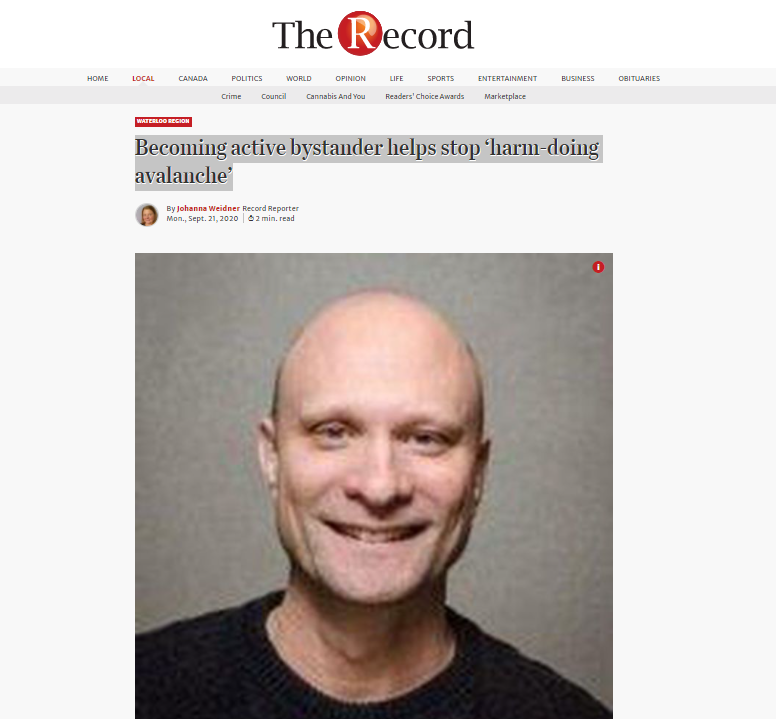
Check out this article on Being an Active Bystander, part of the 2020 Porch Chat Series organized by the Waterloo Region Crime Prevention Council and The Coalition to Keep Families Safe.

Check out this article on Being an Active Bystander, part of the 2020 Porch Chat Series organized by the Waterloo Region Crime Prevention Council and The Coalition to Keep Families Safe.

The Waterloo Region Crime Prevention Council and The Keep Families Safe Coalition are working hard with the #KeepFamiliesSafe Coalition to get the word out to family, friends, neighbors and employers about how they can help prevent increasing family violence during the Pandemic. Coalition Partners are translating this work into many languages and culture within Waterloo Region.
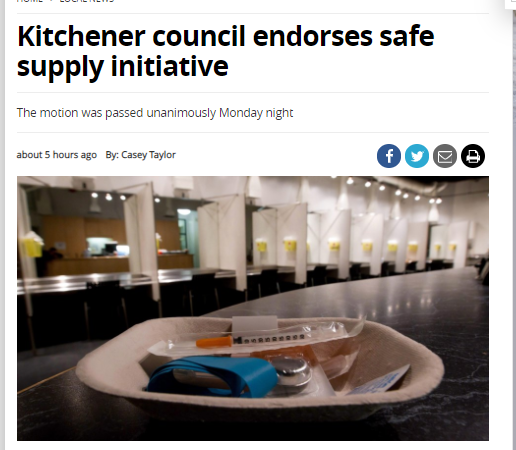 Kitchener City Council is calling on the federal and provincial governments to loosen their purse-strings and fund safe supply initiatives in Waterloo Region.
Kitchener City Council is calling on the federal and provincial governments to loosen their purse-strings and fund safe supply initiatives in Waterloo Region.
A motion was presented to council Monday evening by Ward 10 Councillor Sarah Marsh and it was passed unanimously.
The motion highlights the worsening opioid crisis, saying most overdose deaths stem from an unregulated, contaminated supply.
The concept of safe supply looks to undercut that market.
“Instead of going to a dealer and purchasing drugs, you’d go to a health professional and procure pharmaceuticals from there,” said Michael Parkinson of the Waterloo Region Crime Prevention Council.
Parkinson notes that there are added benefits to these kinds of programs.
“One, nobody dies — that’s pretty significant. The programs that exist — although small in Canada — nobodies died because you know what’s in your substance. You have a high degree of confidence that it’s not contaminated with who knows what. That’s not the situation with the prohibition model that exists in Canada.”
“You wake up and you know where your drugs are going to come from so the whole hustle and grind of stealing stuff, getting the money, locating a dealer, doing the drugs and then repeating several times a day — all of that disappears.”
Parkinson adds that these programs have also been shown to reduce infection and petty crime.
“We should never forget that the point of dependency in addiction, it’s avoiding withdrawal which really drives the behavior, everything else becomes secondary,” said Parkinson.
Parkinson said these programs are less expensive than relying on the enforcement and justice systems.
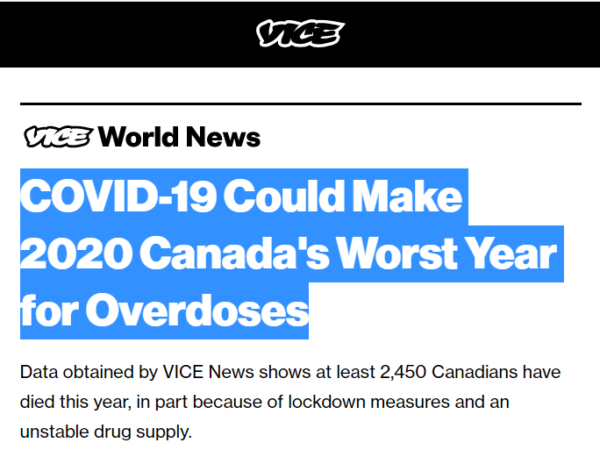
“It’s hit us hard,” Michael Parkinson, drug strategy specialist at the Waterloo Region Crime Prevention Council, told VICE News. In his region alone, in southwestern Ontario, at least 64 people have died of suspected overdoses so far this year, up already from the 63 total deaths there for 2019.
“The people who are paying attention are left on the sidelines to resuscitate people, attend funerals, and to grieve before moving onto the next victim,” he said.

WRCPC’s Michael Parkinson speaks with Mike Farwell about Safe Supply of Street Drugs. Friday, September 4th, 2020 Online petition calls on Canadian governments to increase funding for safer drug supply initiatives (43:26);
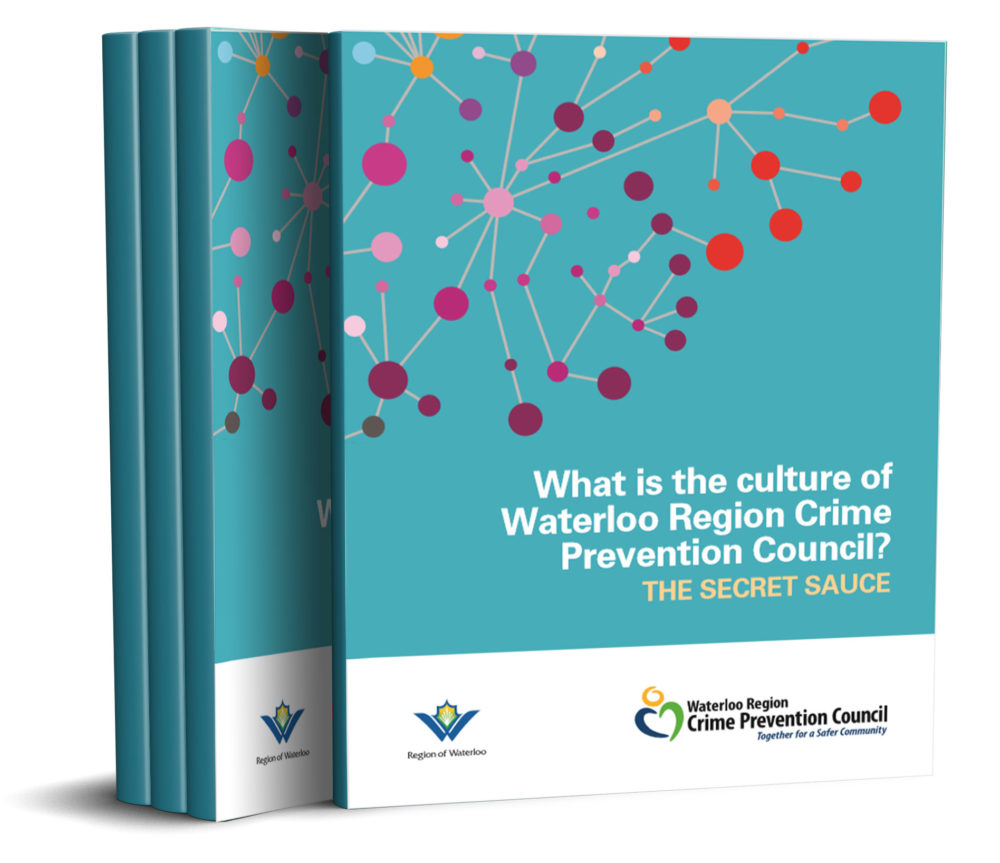 The most recent evaluation of the Council’s community plan illustrated what various elements of WRCPC’s culture look like in action. These elements also come out of a rich body of literature on community organizing, grassroots momentum and citizen engagement. We didn’t just make them up, but rather, over time, we have refined, revised and at times erased certain approaches based on experiences and community feedback. More than just focusing on strategy we have taken care to create a way of working in and with the community that is conducive to building broad ownership of the issues. It has been said that “culture eats strategy for breakfast”. And we agree. The best strategy is only ever as effective as the will to implement it. That sustainable preparedness to work for the best of the community has taken a long time to come together to define our culture. The impact of WRCPC is directly linked to this empowerment agenda. The following statements outline some of the core aspects of WRCPC’s culture along with a selection of illustrative (but by no means exhaustive) examples, some of which are described in more detail in the Appendix. These aspects have been present in one way or another in all of the initiatives of the Council from the early days onwards. While these statements reflect ambitious values and principles, WRCPC consistently continues to strive to adhere to them. This is achieved, in part, through ongoing critical reflection and evaluation.
The most recent evaluation of the Council’s community plan illustrated what various elements of WRCPC’s culture look like in action. These elements also come out of a rich body of literature on community organizing, grassroots momentum and citizen engagement. We didn’t just make them up, but rather, over time, we have refined, revised and at times erased certain approaches based on experiences and community feedback. More than just focusing on strategy we have taken care to create a way of working in and with the community that is conducive to building broad ownership of the issues. It has been said that “culture eats strategy for breakfast”. And we agree. The best strategy is only ever as effective as the will to implement it. That sustainable preparedness to work for the best of the community has taken a long time to come together to define our culture. The impact of WRCPC is directly linked to this empowerment agenda. The following statements outline some of the core aspects of WRCPC’s culture along with a selection of illustrative (but by no means exhaustive) examples, some of which are described in more detail in the Appendix. These aspects have been present in one way or another in all of the initiatives of the Council from the early days onwards. While these statements reflect ambitious values and principles, WRCPC consistently continues to strive to adhere to them. This is achieved, in part, through ongoing critical reflection and evaluation.
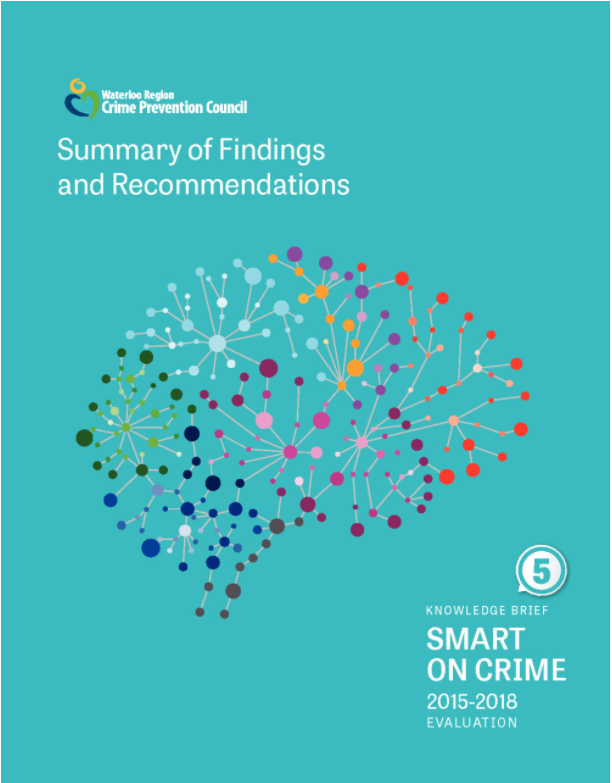
The results from the evaluation provide evidence that WRCPC plays a unique and central role within Waterloo region. An increasing number of sectors are starting to realize the importance of backbone organizations, which have the ability and trust to bring together diverse stakeholders to collaboratively
and sustainably address complex social issues, such as poverty, environmental degradation, and crime. In multiple ways, the evaluation revealed that WRCPC fulfills exactly that role for crime prevention and has done so for multiple decades. The findings also highlighted the importance of WRCPC’s unique position in the community – being arms-length from the Regional government, not being responsible for a specific single sector, and being relatively independent of various funders. This was considered important because it provides a safe space to i) have the kind of honest conversations that are necessary to find creative
solutions to complex issues and ii) develop a shared vision and message among sectors, system decision-makers and the broader community.
To read the full report: WRCPC_KB5_PRINT_NoCrops
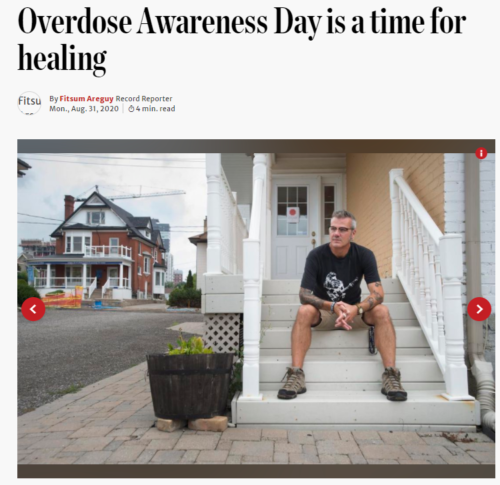
Toronto recently received federal funding for two safe supply programs. Michael Parkinson of the Waterloo Region Crime Prevention Council also supports safe supply as a proven approach.
“Safe supply initiatives with pharmaceutical medications … in a therapeutic context are backed by more than 25 years of evidence, showing substantial benefits in both individual and community health and safety.”
Parkinson wrote that “for people using unregulated substances who find themselves marginalized by human structures and systems … safe supply offers an opportunity to reverse the historical over-incarceration of our friends and neighbours at a fraction of the cost.”

#KeepFamiliesSafe
“Please pay attention and please do reach out if you think someone needs help,” said Karen Spencer, executive director of Family & Children’s Services of the Waterloo Region. “The families that were struggling before COVID are really struggling now.”
Between September 2016 and April 2019 a team at the Centre for
Community Research Learning and Action (CCRLA) at Wilfrid Laurier
University conducted a multi-phase participatory developmental
evaluation of the Waterloo Region Crime Prevention Council’s
(WRCPC) 2015-2018 Smart on Crime Community Plan: Making the
Connection between Community Safety and Community Vitality in
Waterloo Region. This is the first of five knowledge briefs (KB), which
feature the following topics:
• The purpose of the evaluation, the evaluation approach and
methodology, as well as the theory of change (KB I)
• The three most significant change stories that represent the
contributions of WRCPC in the community through the Smart on
Crime plan (KBs II-IV), and
• An overall summary of key findings with recommendations for
future strategic actions and directions (KB V).
To read the full report: WRCPC_KB1_PRINTNoCrops